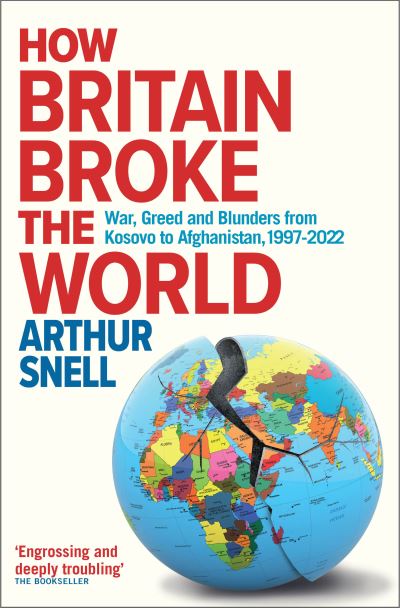Description
“Buy this book” – John Sweeney
“Engrossing and frankly deeply troubling” – The Bookseller
“I cannot recommend this book highly enough” – Monocle
“Engaging, authentic and original analyses “Â –Â Â Shakespeare & Co
Description
Turmoil in the 2020s.
Russia is destroying Ukraine.
China threatens Taiwan and Southeast Asia
Endless war in the Middle East sends waves of migrants and terrorists washing around the world
And the biggest nations on Earth cannot agree effective action to stop the worst effects of global heating.
Instead of being a global force for good, Britain has often fostered instability and division. In fact, the UK’s careless ‘humanitarian’ interventions, grandiosity and greed have helped to fracture the global order built after World War II.
is the world so dangerous now?
How Britain Broke the World is by former senior British diplomat Arthur Snell.
It critically assesses UK foreign policy over the past 25 years, from Kosovo in 1998 to Afghanistan in 2021, while also scrutinising British policy towards the powerhouses of the USA, Russia, India, and China.
Far from being unimportant, Snell reveals, Britain has often played a pivotal role in world affairs. For instance, London supplied the false intelligence that justified the Allied invasion of Iraq and plugged Russia’s corrupt elite into Western economies.
Then come the bungled humanitarian interventions in foreign states.
Without the UK’s marginal but key role, the author argues, it’s likely that wars would not have blighted the Balkans, Iraq, and Libya, hundreds of thousands of lives would have been saved, and the world would be a safer place in the 2020s.
Taking in Russia’s full-scale invasion of Ukraine in 2022, Snell charts the key political, economic and geographic factors that drive the behaviour of the most powerful and populous countries.
Like a diplomatic version of Prisoners of Geography by Tim Marshall, How Britain Broke the World reveals the ignominious reality of UK foreign policy and the true state of world affairs. It is a must-read for anyone interested in Britain’s role in international affairs.
Review
‘In this engrossing and frankly deeply troubling book, former senior British diplomat Snell explains how Britain’s often incompetent, inconsistent and sometimes downright greedy foreign policy has played a pivotal role in rendering the world a more dangerous place.
‘Not only in regard to Russia, where successive British governments have helped to plug Putin’s oligarchy into the Western economic system, but also when it comes to the wars in Kosovo, Iraq, Libya and more’
Caroline Sanderson, awarding an ‘Editor’s Choice’ for Non-fiction, The Bookseller
About the Author
After graduating from Oxford with a first class degree in history, Arthur Snell joined the Foreign and Commonwealth Office.
A fluent Arabic speaker, he served in Afghanistan, Zimbabwe, Nigeria, Yemen, and Iraq.
He headed the international strand of the UK Government’s Prevent counterterrorism programme.
He is currently a geopolitical consultant and host of the hit podcast Doomsday Watch.
Contents
Introduction
1. An ‘Ethical’ Foreign Policy
2. Kosovo: War in Europe
3. Iraq, MI6 and a Botched Invasion
4. Afghanistan: ‘Government in a Box’
5. Libya: Creating a Power Vacuum
6. Syria: A Conflict Without End
7. Russia and the London Laundromat
8. China: the Golden Error of Kowtow
9. Saudi Arabia, Oil and Influence
10. India and the Politics of Empire
11. The US and the UK ‘Special’ Relationship
12. Brexit: Isolation in Europe
Buy the book to carry on reading




